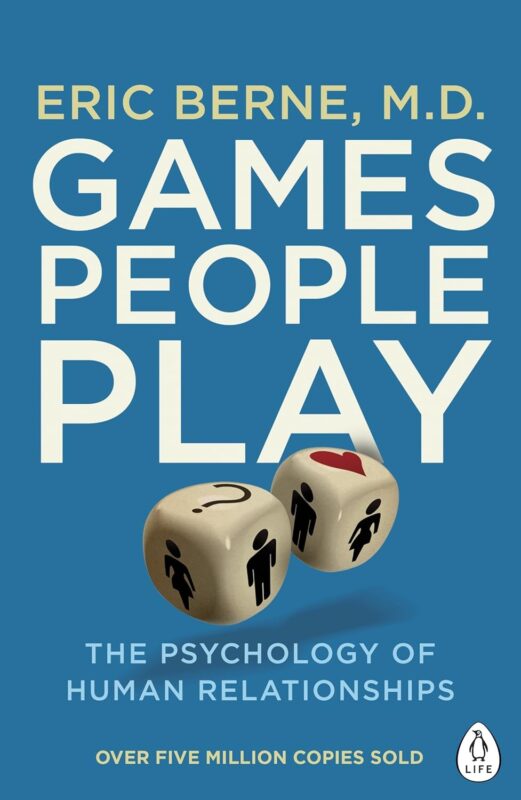I didn’t have much faith in psychiatrists… until now. It’s amazing how studying people and interactions can reveal so much and categorise the type of interactions. So lets break it down. First the writer differentiates between procedures, rituals, pastimes and games. Games is the only one in which people use the interaction to get something out of. As in ulterior motives, consciously or unconsciously. Normal interaction e.g. in units – On a hi bye basis it’s say 3 units each. Hi – hi, how you doing – fine, how you doing, same old – well see you later. Now in this interaction both parties are used to 3 units of transaction daily. So if you go on a holiday and don’t interact with the person the units build up so next time both sides have to make up for the units by adding stuff like ‘not seen you in a while, where did you go, I really needed that holiday, you should go there, etc’.
Short video example
Now explaining all this jazz. So first everybody has an inner parent, adult and child. Whoever starts the interaction (agent) comes from one of these spaces and then the person replying (respondent) will come back from one of these spaces. Your inner parent is you doing what your parents do, your inner child is what you did as a child and your adult is you in your present moment. E.g. of adult – adult transaction is ‘do you know where the keys are’ – ‘they’re on the desk’. E.g. of parent – child transaction is ‘you keep losing the keys’ – ‘you always blame me for everything’. It’s not always negative but you can tell from the transaction.
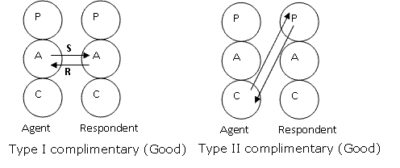
So far I’ve only given an example of complementary transactions where the parent state is talking to the child state and child state replies to parent state. It gets more complex as parent state can talk to child state and the reply would be from parent state to child or adult or parent state. Hopefully the diagrams gives you a better idea since we’ve not even got the games yet. So while these interactions are happening on a social level there is a different game happening on a psychological level. E.g. Hubby parent interacts on a social level with Wife child by telling her ‘stay at home’, and wife plays the ‘if it weren’t for you’ game. On the psychological level his child is really interacting with her as ‘I’m terrified’ and her child replies with the ‘protect me’ frame.
Most of the games are broken down into things like Thesis, Roles, Examples, Paradigms, Moves, Advantages and Antithesis. And that is further broken down to more.
Amazon #ads

Frigid Woman game:
ANALYSIS
– Thesis: Now I’ve got you, you son of a bitch. Aim: Vindication.
– Roles: Proper Wife, Inconsiderate Husband.
– Dynamics: Penis envy.
– Examples:
(1) Thank you for the mud pie, you dirty little boy.
(2) Provocative, frigid wife.
– Social Paradigm: Parent-Child.
Parent: “I give you permission to make me a mud pie (kiss me)-“
Child: “I’d love to.”
Parent: “Now see how dirty you are.”
– Psychological Paradigm: Child-Parent.
Child: “See if you can seduce me.”
Parent: ‘I’ll try, if you stop me.”
Child: “See, it was you who started it”
– Moves:
(1) Seduction-Response.
(2) Rejection-Resignation.
(3) Provocation-Response.
(4) Rejection-Uproar.
– Advantages:
(1) Internal Psychological—freedom from guilt for sadistic fantasies.
(2) External Psychological— avoids feared exhibition and penetration.
(3) Internal Social—”Uproar.”
(4) External Social—What do you do with dirty little boys (husbands)?
(5) Biological—inhibited sex play and belligerent exchanges.
(6) Existential—I am pure.
Ok so the games. I’ll only share two examples.
– If it weren’t for you. Say the wife plays this game. She naturally finds a partner that will be protective and stop her from doing things. The thing is that she needs someone to stop her and at the same time does not want to blame herself for not being able to do stuff so it works. Usually the partner would play ‘I’ve got you now you son of a bitch‘. So say she complains about him not letting her go dancing and he stops playing and lets her go. She will end up trying it out and remember she has a phobia for the dance floor or something like that. And the partner then gets to continue his game of I’ve got you now. Note: This is a game couples play a lot.
– Why don’t you, yes but. This is usually played in social settings where White would bring up a problem and Black would give a ‘why don’t you’ solution, White would say ‘yes, but’ this and yes but that. If Black does not play by changing the subject or give a solution that White cannot refute, the game is over. And this to White is unacceptable, White will not try interact with Black again knowing that Black does not play the game White likes.
So there you have it. People like playing certain games and usually they’re not destructive as long as all parties concerned get what they want or enjoy playing. The roles are not always solid like Alcoholic can shift roles from robber to cop. For robbers they either have the joy of the chase and being caught and let go or they are actually doing it for the money etc.
Amazon #ads

Dr. Eric Berne – Games People Play – The Theory Part I (Summary of all videos below)
Dr. Eric Berne – Games People Play – The Theory Part 2
Summary:
– Transactional analysis is a system for studying, changing and predicting peoples behaviour.
– There is no reason to get angry. It’s more of a fun thing and makes you feel that you’re right and look for legitimate use and you feel self-righteous. It’s never any good.
– Anger is always a child or a parent dynamic. Try to see it as an interesting project to bring out the adult in you or the other person.
– The parent, adult and child egos are always present in your reality.
– Baby starts off as a child ego state, then it realises that the breast is not part of me and beginning to use it’s adult ego. It starts becoming a parent when it starts snitching. I will tell if you don’t put the thing back.
– The parent is borrowed depending on each culture.
– The adult is like a computer just takes information and unemotionally figures things out.
– The child is the spontaneous, creative and sees things in a different way.
– The best way to see a transaction is to see what are both people getting out of it. Even a simple hello can turn wrong if the other person doesn’t say hello back or uses the wrong tone.
– A transaction called withdrawal is when the person is physically there but not mentally present.
– Another one is called rituals where a series of interactions follow each other. Hello, look at the weather, etc.
– After getting past rituals the transaction moves into pastime. They give the person feeling of saying something original but they are pretty standardaised. I feel so and so about this. A mother in a party will go through the PTA pastime as in how to be a good parent.
– Pastimes will transition one of 2 ways.
1 Work: Doing factual things, building things together, etc.
2 Games: People get certain satisfaction that are real out of these. Satisfactions like anger, hurt, fear, inadequacies.
– After games comes relationship games. Wanting a feeling of intimacy. Intimacy is a game-free, candid and frank relationship. It’s not sexual as sex can fit in any relationship. While games are exploitative, they still bring a feeling of closeness.
– So there are 6 levels and once you get past the 5.
1 – no rituals,
2 – no activities,
3 – no pastimes,
4 – no games and
5 – you must not withdraw. Then you get to
6 – intimacy.
In other words, the 6 ways of structuring time are – rituals, pastimes, activities, games, intimacy and if all else fails, withdrawal.
– Existentially all games are bad as they involve some kind of con. Some games work for both parties e.g. Cavalier – where the man gives compliments to make her feel good and he feels good for being creative and cavalier. In the holiday game he says he wishes he could help out someone but he’s on holiday or helping someone else in a way.
– A game has to have 3 characteristics.
1 – Con: You say you want to help with something but you really want to do something else.
2 – Gimmick: The weakness that makes the other person want to play the game. Like asking a person who likes to help for help.
3 – Payoff: The feeling people get from playing the game. You’re exchanging trading stamps. In the example of asking for help from someone who likes helping, you both exchanged gold trading stamps. Brown trading stamps is when someone trades to get a bad feeling like guilt or anger.
– Games are like a lot of trash in peoples mind. After they get rid of the trash they can start seeing reality fresh.
Amazon #ads

Dr. Eric Berne – Games People Play – The Practice Part 1 (Summary below the videos)
Dr. Eric Berne – Games People Play – The Practice Part 2
Summary:
– 5 words: Parent, Adult, Child, Game and Script. A new one is a Contract.
– Game is a stereotyped pattern that people do everyday and comes up the same way all the time.
– The script is a life long or life plan that a person has followed and was created when they were a child so it doesn’t serve them as adults. You can change it! One way is psychotherapy.
– Schizophrenia is not a bad thing because everyone has at least 3 people in their head.
– In the contract, a patient would be clear about what they want from the psychotherapist. The patient had to know what is going on with them.
– Some things are very easy to tell especially with physiology. A patient’s issue with relationships will be broken down. They feel funny when entering a room with people. They feel it in their stomach. There is always a physiological reaction in an emotional situation.
– They have a staff conference in front of the patient about the patient. They found that the patient listens quietly and starts moving toward the adult ego.
– Feeling funny in a crowded party will be the child ego’s reaction. Did they really feel that way when they were a child? Something about how he was raised. Watch your manners, people are watching, you’ll be judged! They’ve collected the scared stamp. Then see how they go about scary transactions as an adult.
– Scripts are created at a young age and held on to usually for life. Then they latch onto a fairy-tale of how they want things to be. It’s good to ask what their fairy-tale is.
– The Rapunzel fairy-tale comes down to her not wanting to give up her symptom. Rapunzel really wanted to get rid of the prince so she could start over with her grandmother/witch. On the other hand, the prince is a loser and wants to get into trouble. The patient is telling you that they want to end up in some kind of wilderness with a loser.
– Permission is a big one. You have to give the patient permission NOT to gamble. A father gives a daughter permission to be beautiful by telling her constantly how pretty she is, just like mommy.
Amazon #ads

Contents
– Preface
– Introduction
1 Social Intercourse
2 The Structuring Of Time
– Part I Analysis Of Games
Chapter 1 Structural Analysis
Chapter 2 Transactional Analysis
Chapter 3 Procedures And Rituals
Chapter 4 Pastimes
Chapter 5 Games
1 Definition
2 A Typical Game
3 The Genesis Of Games
4 The Function Of Games
5 The Classification Of Games
– Part II A Thesaurus Of Games
Introduction
1 Notation
2 Colloquialisms
Chapter 6 Life Games
1 Alcoholic
2 Debtor
3 Kick Me
4 Now I’ve Got You, You Son Of A Bitch
5 See What You Made Me Do
Chapter 7 Marital Game
1 Corner
2 Courtroom
3 Frigid Woman
4 Harried
5 If It Weren’t For You
6 Look How Hard I’ve Tried
7 Sweetheart
Chapter 8 Party Games
1 Ain’t It Awful
2 Blemish
3 Schlemiel
4 Why Don’t You-Yes But
Chapter 9 Sexual Games
1 Let’s You And Him Fight
2 Perversion
3 Rapo
4 The Stocking Game
5 Uproar
Chapter 10 Underworld Games
1 Cops And Robbers
2 How Do You Get Out Of Here
3 Let’s Pull A Fast One On Joey
Chapter 11 Consulting Room Games
1 Greenhouse
2 I’m Only Trying To Help You
3 Indigence
4 Peasant
5 Psychiatry
6 Stupid
7 Wooden Leg
Chapter 12 Good Games
1 Busman’s Holiday
2 Cavalier
3 Happy To Help
4 Homely Sage
5 They’ll Be Glad They Knew Me
– Part III Beyond Games
Chapter 13 The Significance Of Games
Chapter 14 The Players
Chapter 15 A Paradigm
Chapter 15 Autonomy
Chapter 17 The Attainment Of Autonomy
Chapter 18 After Games,What?
– Appendix
The Classification Of Behavior
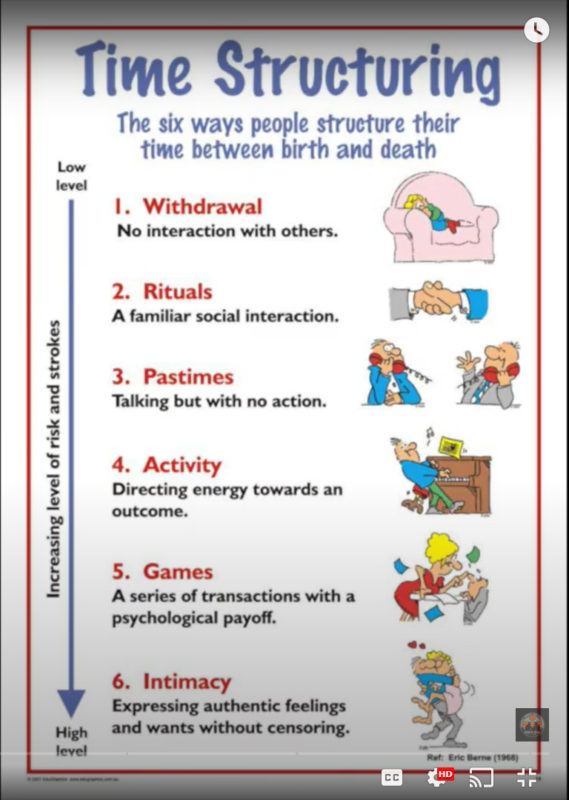
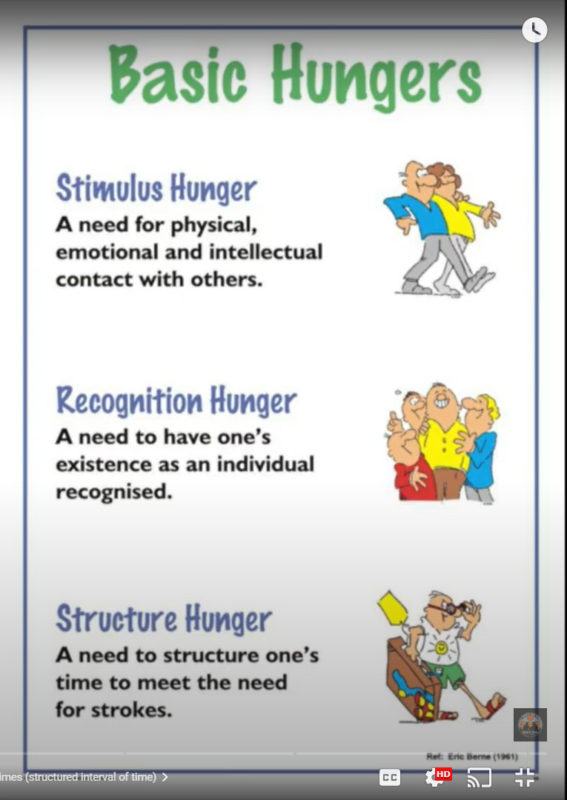
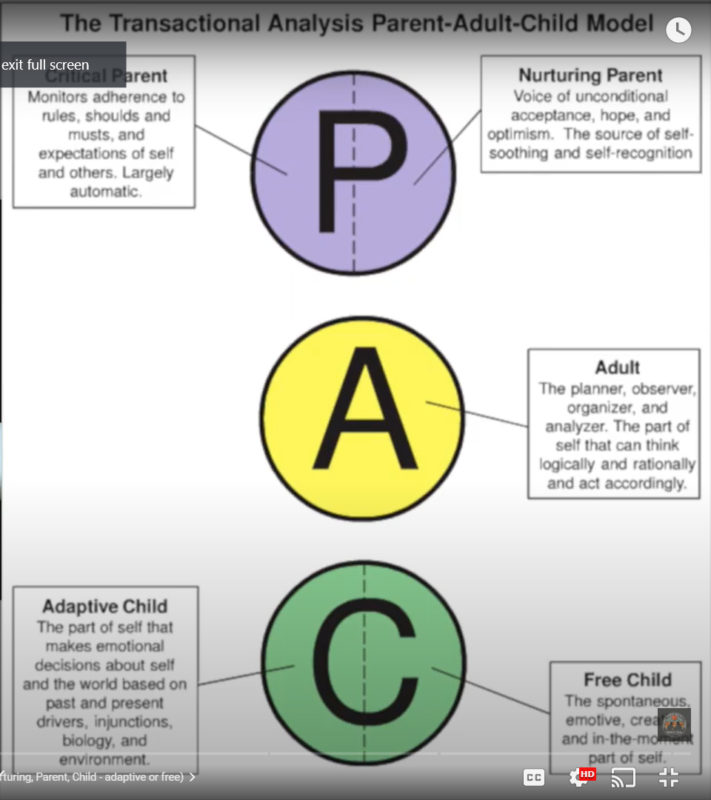
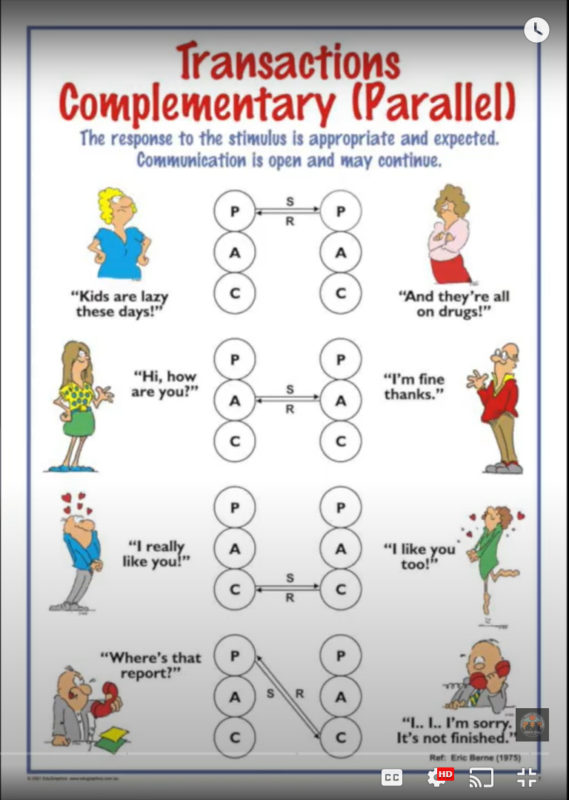
Amazon #ads

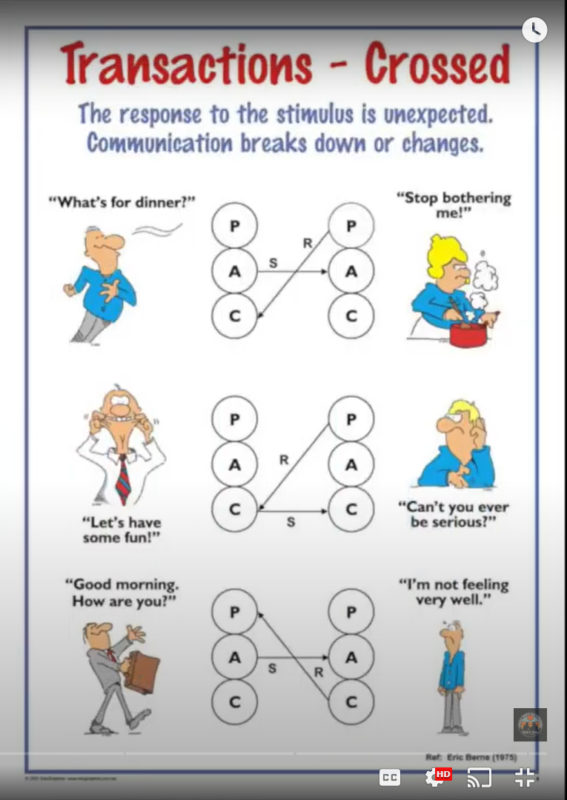
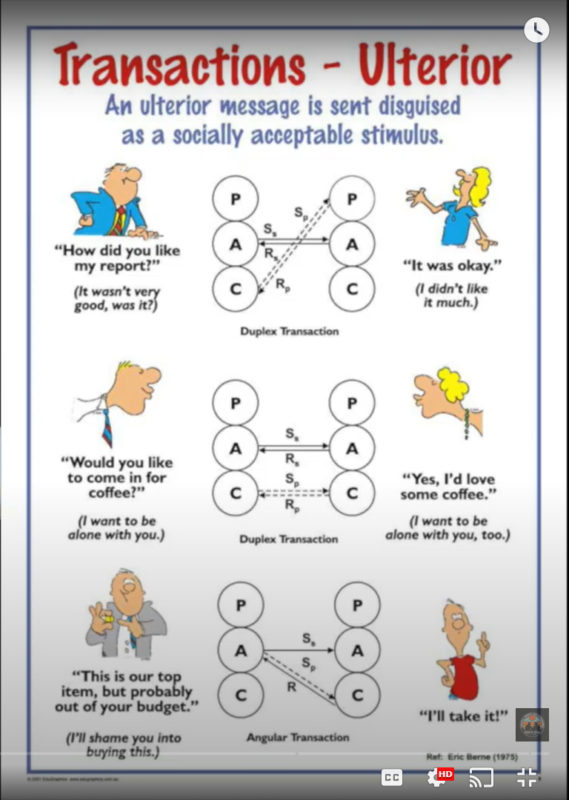
Amazon #ads

